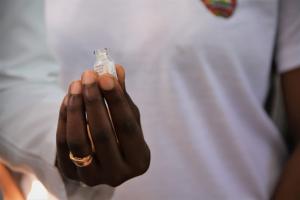Speedy vaccination campaign helps stop cholera outbreak in Niger
Niamey – "What I experienced with this disease is terrible. I saw death at close range."
Amadou Elh Mamoudou counts himself fortunate. The 35-year-old survived a cholera outbreak in his village of Maradi, in south-central Niger, one of the areas most affected by the outbreak between March and December 2021.
Once recovered, Amadou joined health workers in his district to convince people there to get vaccinated, ultimately helping his district to achieve a 98% vaccination coverage.
Vaccination contributed to the fight against the cholera epidemic that affected seven regions of Niger, causing 5591 infections and 166 deaths, with a case-fatality rate of 3%. Vaccination coverage of 95%, combined with good patient management and hygiene and sanitation awareness, led to a significant decrease in the number of new cases, until the epidemic was declared over in the following weeks.
Two key interventions enabled health authorities, supported by the World Health Organization (WHO) and its partners, to rapidly deploy the vaccine in the four most affected regions (Dosso, Maradi, Tahoua, and Zinder) and administer it to nearly 1.9 million people.
The first intervention was to deploy the vaccine as close to the population as possible, instead of holding vaccination sessions at fixed locations.
"The adoption of the door-to-door strategy avoided massive gatherings, which would have increased close contact between patients and populations at risk of contracting the disease," explains Dr Blanche Anya, WHO Resident Representative in Niger. "This strategy also improved the delivery of vaccination to communities in hard-to-reach locations.”
Another intervention was the rapid deployment of the vaccine to three refugee camps in the Maradi region, thanks to a partnership between the government, WHO, and the International Red Cross Federation.
These interventions were preceded by major awareness-raising efforts to overcome people’s hesitancy towards the vaccine. Here, the participation of former patients like Amadou and other locals was pivotal.
"We deployed local town criers and used local radio stations to spread messages. Mosques and other places of worship were also engaged. In each team, we had a mobilizing agent who helped encourage target populations to get vaccinated," explains Djibo Moukaïla Djibo, mayor of Gaya, the capital of a health district in the Dosso region.
Although the epidemic was declared over last December, three of the four regions targeted for vaccination are still scheduled for a second round in May, as per WHO recommendations. The cholera vaccination campaign plays a preventive role, by strengthening the population's immunity ahead of the next rainy season, which is conducive to the spread of cholera.
"Even if the epidemic is over, we remind people that the risk of new epidemics exists. Receiving two doses of the vaccine protects against cholera for at least three years,” says Dr Mahaman Maman Sani, Regional Director of Public Health for the Dosso region.
A combination of prevention and treatment measures for cholera, such as access to clean water and adequate sanitation, hand washing, safe food preparation, vaccine administration and prompt treatment with oral rehydration, “has a huge advantage: the prospect of being protected against cholera for several years,” says Dr Sani.
